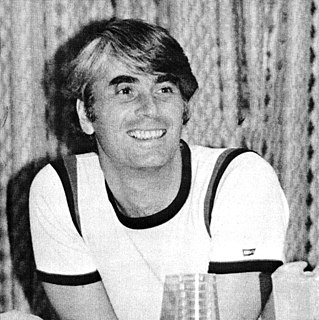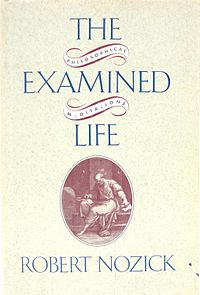Anarcho-capitalism is a political philosophy that advocates the elimination of centralized states in favor of a system of private property enforced by private agencies, free markets and the right-libertarian interpretation of self-ownership, which extends the concept to include control of private property as part of the self. In the absence of statute, anarcho-capitalists hold that society tends to contractually self-regulate and civilize through participation in the free market which they describe as a voluntary society. In a theoretical anarcho-capitalist society, the system of private property would still exist and be enforced by private defense agencies and/or insurance companies selected by customers which would operate competitively in a market and fulfill the roles of courts and the police.
Anarcho-communism, also known as anarchist communism, is a political philosophy and anarchist school of thought which advocates the abolition of the state, capitalism, wage labour, social hierarchies and private property. It retains respect for personal property along with collectively-owned items, goods and services. It supports common ownership of the means of production and direct democracy as well as a horizontal network of workers' councils with production and consumption based on the guiding principle "From each according to his ability, to each according to his needs". Some forms of anarcho-communism such as insurrectionary anarchism are strongly influenced by egoism and radical individualism, believing anarcho-communism to be the best social system for the realization of individual freedom. Most anarcho-communists view anarcho-communism as a way of reconciling the opposition between the individual and society.

Robert Nozick was an American philosopher. He held the Joseph Pellegrino University Professorship at Harvard University, and was president of the American Philosophical Association. He is best known for his books Philosophical Explanations (1981), which included his counterfactual theory of knowledge, and Anarchy, State, and Utopia (1974), a libertarian answer to John Rawls' A Theory of Justice (1971), in which Nozick also presented his own theory of utopia as one in which people can freely choose the rules of the society they enter into. His other work involved ethics, decision theory, philosophy of mind, metaphysics and epistemology. His final work before his death, Invariances (2001), introduced his theory of evolutionary cosmology, by which he argues invariances, and hence objectivity itself, emerged through evolution across possible worlds.
Libertarian theories of law build upon classical liberal and individualist doctrines.

Anarchy, State, and Utopia is a 1974 book by the American political philosopher Robert Nozick. It won the 1975 US National Book Award in category Philosophy and Religion, has been translated into 11 languages, and was named one of the "100 most influential books since the war" (1945–1995) by the UK Times Literary Supplement.

A night-watchman state, minarchy, or minarchism, whose proponents are known as minarchists, is a model of a state that is limited and minimal, whose functions depend on libertarian theory. Right-libertarians support it only as an enforcer of the non-aggression principle by providing citizens with the military, the police, and courts, thereby protecting them from aggression, theft, breach of contract, fraud, and enforcing property laws.
Anarchist economics is the set of theories and practices of economic activity within the political philosophy of anarchism. Many anarchists are anti-authoritarian anti-capitalists, with anarchism usually referred to as a form of libertarian socialism, i.e. a stateless system of socialism. Anarchists support personal property and oppose capital concentration, interest, monopoly, private ownership of productive property such as the means of production, profit, rent, usury and wage slavery which are viewed as inherent to capitalism.
The nature of capitalism is criticized by anarchists, who reject hierarchy and advocate stateless societies based on non-hierarchical voluntary associations. Anarchism is generally defined as the libertarian philosophy which holds the state to be undesirable, unnecessary and harmful as well as opposing authoritarianism, illegitimate authority and hierarchical organization in the conduct of human relations. Capitalism is generally considered by scholars to be an economic system that includes private ownership of the means of production, creation of goods or services for profit or income, the accumulation of capital, competitive markets, voluntary exchange and wage labor which has generally been opposed by anarchists historically. Since capitalism is variously defined by sources and there is no general consensus among scholars on the definition nor on how the term should be used as a historical category, the designation is applied to a variety of historical cases, varying in time, geography, politics and culture.
Samuel Edward Konkin III, also known as SEK3, was an American libertarian philosopher. As the author of the publication New Libertarian Manifesto, he was a proponent of a political philosophy he named agorism.

The Lockean proviso is a feature of John Locke's labor theory of property which states that whilst individuals have a right to homestead private property from nature by working on it, they can do so only "at least where there is enough, and as good, left in common for others".
Propertarianism, or proprietarianism, is a political philosophy that reduces all questions of ethics to the right to own property. On property rights, it advocates private property based on Lockean sticky property norms, where an owner keeps his property more or less until he consents to gift or sell it, rejecting the Lockean proviso.
Libertarianism is a political philosophy that upholds liberty as a core value. Libertarians seek to maximize autonomy and political freedom, minimize the state; emphasizing free association, freedom of choice, individualism and voluntary association. Libertarians share a skepticism of authority and state power, but some libertarians diverge on the scope of their opposition to existing economic and political systems. Various schools of libertarian thought offer a range of views regarding the legitimate functions of state and private power, often calling for the restriction or dissolution of coercive social institutions. Different categorizations have been used to distinguish various forms of libertarianism. Scholars distinguish libertarian views on the nature of property and capital, usually along left–right or socialist–capitalist lines.
In the United States, libertarianism is a political philosophy promoting individual liberty. According to common meanings of conservatism and liberalism in the United States, libertarianism has been described as conservative on economic issues and liberal on personal freedom, often associated with a foreign policy of non-interventionism. Broadly, there are four principal traditions within libertarianism, namely the libertarianism that developed in the mid-20th century out of the revival tradition of classical liberalism in the United States after liberalism associated with the New Deal; the libertarianism developed in the 1950s by anarcho-capitalist author Murray Rothbard, who based it on the anti-New Deal Old Right and 19th-century libertarianism and American individualist anarchists such as Benjamin Tucker and Lysander Spooner while rejecting the labor theory of value in favor of Austrian School economics and the subjective theory of value; the libertarianism developed in the 1970s by Robert Nozick and founded in American and European classical liberal traditions; and the libertarianism associated to the Libertarian Party which was founded in 1971, including politicians such as David Nolan and Ron Paul.
Right-libertarianism, also known as libertarian capitalism or right-wing libertarianism, is a political philosophy and type of libertarianism that supports capitalist property rights and defends market distribution of natural resources and private property. The term right-libertarianism is used to distinguish this class of views on the nature of property and capital from left-libertarianism, a type of libertarianism that combines self-ownership with an egalitarian approach to natural resources. In contrast to socialist libertarianism, right-libertarianism supports free-market capitalism. Like most forms of libertarianism, it supports civil liberties, especially natural law, negative rights, and a major reversal of the modern welfare state.

The Examined Life is a 1989 collection of philosophical meditations by the philosopher Robert Nozick. The book drew a number of critical reactions. The work is drawn partially as a response to Socrates assertion in Plato's "The Apology of Socrates" that the unexamined life is one not worth living

For a New Liberty: The Libertarian Manifesto is a book by American economist and historian Murray Rothbard, in which the author promotes anarcho-capitalism. The work has been credited as an influence on modern libertarian thought and on part of the New Right.
This article is a list of major figures in the theory of libertarianism, a philosophy asserting that individuals have a right to be free. Originally coined by French anarchist and libertarian communist Joseph Déjacque as an alternative synonymous to anarchism, American classical liberals appropriated the term in the 1950s for their philosophy which asserts that individuals have a right to acquire, keep and exchange their holdings and that the primary purpose of government is to protect these rights. As a result of this history, libertarians on this list may be either of the American-style free-market variety or of the European-style socialist variety.
The following outline is provided as an overview of and topical guide to anarchism, generally defined as the political philosophy which holds the state to be undesirable, unnecessary and harmful, or alternatively as opposing authority and hierarchical organization in the conduct of human relations. Proponents of anarchism, known as anarchists, advocate stateless societies or non-hierarchical voluntary associations.
The following outline is provided as an overview of and topical guide to libertarianism, a political philosophy that upholds liberty as its principal objective. As a result, libertarians seek to maximize autonomy and freedom of choice, emphasizing political freedom, voluntary association and the primacy of individual judgment.
Anarchy is a society being freely constituted without authorities or a governing body. It may also refer to a society or group of people that entirely rejects a set hierarchy. Anarchy was first used in English in 1539, meaning "an absence of government". Pierre-Joseph Proudhon adopted anarchy and anarchist in his 1840 treatise What Is Property? to refer to anarchism, a new political philosophy and social movement that advocates stateless societies based on free and voluntary associations. Anarchists seek a system based on the abolition of all coercive hierarchy, in particular the state, and many advocate for the creation of a system of direct democracy and worker cooperatives.





